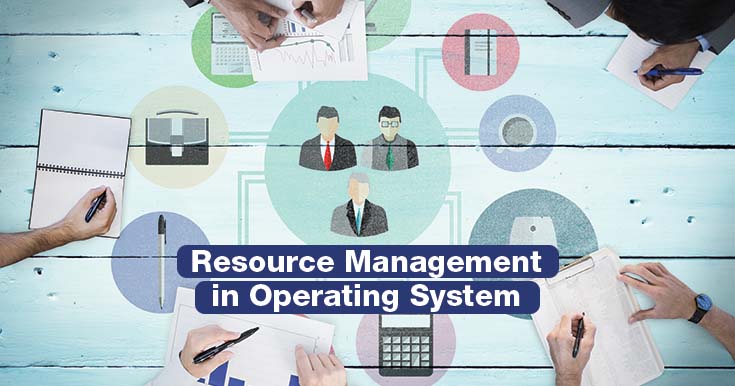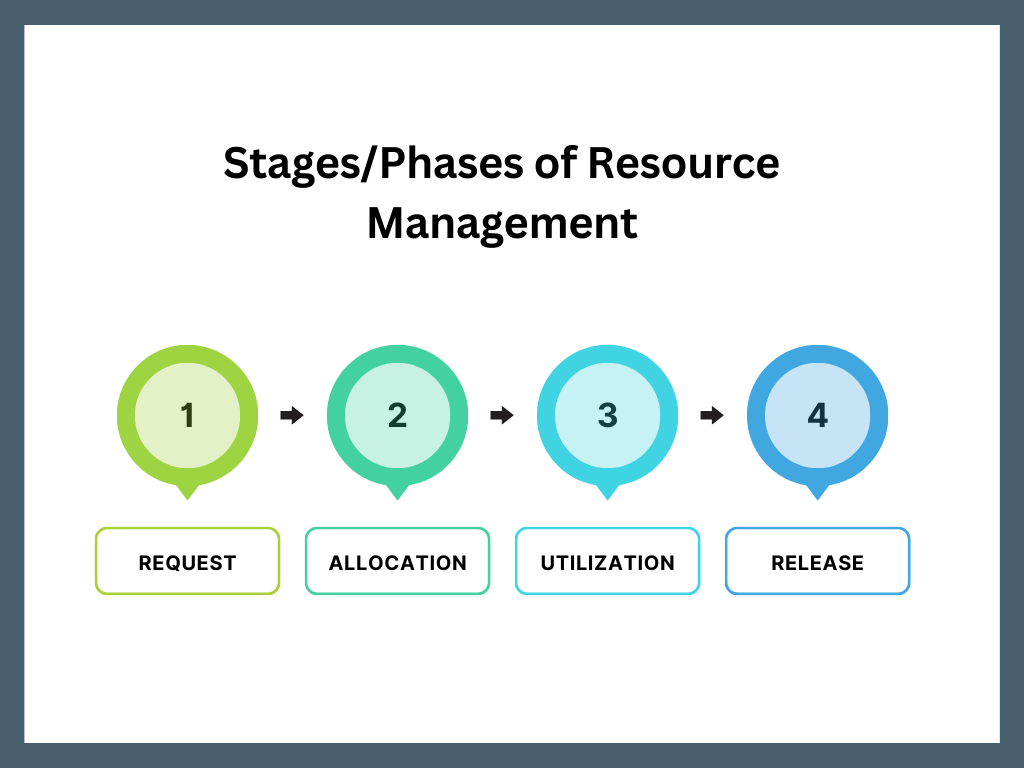What is Resource Management in Operating Systems? Definition & Best Practices in 2026
Strengthen system performance with fair allocation, secure access control, and efficient resource scheduling in operating systems. Book your free consultation today!
14 +
Years of Experience
550 +
Happy Customers
250 +
Years of Tech Leadership Exp.

"License Reseller" and "Consulting & Implementation" Partner

TL;DR
- Resource management allocates and optimizes CPU time, memory, storage, I/O devices, and network resources.
- Effective management ensures system stability, performance, fairness, and security.
- Challenges include fragmentation, deadlocks, starvation, and security vulnerabilities.
- The OS handles resources through request, allocation, utilization, and release to maintain efficiency and reliability.
Overview
Today’s world is digital in nature, where computers are the workhorses of our lives. The machines juggle many balls at once, such as running complex software and streaming videos. However, an operating system (OS), which remains invisible to computer users, must be in place so that all these tasks can run smoothly. Resource management in operating system is also an important function of the OS that involves the allocation and efficient control of finite resources possessed by a computing device. Let’s look into this basic concept and see how it makes our digital world tick.
What is Resource Management in Operating System?
Resource Management in operating system refers to allocating, controlling, and optimizing the utilization of various hardware and software resources available within a computer system. These include any entities that can be dynamically assigned and used by programs when they execute on a computer. Just like a professional juggler who keeps several balls up at once without dropping them, thus preventing system crashes or slowdowns.
Types Of Resource Management
There are several key resource types that an operating system manages:
- Central Processing Unit (CPU): This consists of the brain behind any computer’s operation, tasked with executing commands given to it. Efficient allocation of CPU time for different programs ensures no single program takes advantage of processing power meant for others.
- Memory (RAM): This is the temporary storage in which both programs and data that are actively running are stored. Resource management in operating system entails the provision of space for a program when it needs memory and taking it back after its execution to ensure its smooth running without absorbing all available memory.
- Storage (Hard Disk Drives, Solid State Drives): These are used for long-term storage of programs and data. Resource management controls access to these storage devices, optimizes data transfer, and prevents conflicts between programs that try to access the same storage space at once.
- Input/Output (I/O) Devices: These include components like printers, keyboards, and network cards, among others. They facilitate communication with the outside world. Resource management ensures efficient utilization of these devices, preventing conflicts and ensuring data is transferred accurately.
- Network Resources: In a networked environment, resource management controls access to network bandwidth as well as shared printers and file servers.
Why is Effective Resource Management in Operating Systems Important?
Efficient resource management in operating system is critical for several reasons:
- System Stability: If resources are not appropriately allocated, some programs may start consuming more resources than required, leading to crashes or hangs.
- Performance Optimization: When resource management is done effectively, it will ensure that these programs get what they need in order to function properly without hanging or slowing down system speed at large.
- Fairness and Multitasking: Different programs can run simultaneously to attain fairness in resource management while ensuring each program gets a fair share of the resources it needs.
- Security: Security is a core aspect of resource management, as it can help reduce security risks by limiting access to essential system elements and preventing unauthorized utilization.
Challenges for Resource Management in Operating Systems
Resource management isn’t without its hurdles. While the core principles seem straightforward, real-world scenarios can get messy. Fragmentation occurs as programs are allocated and released from memory, leaving scattered chunks that can’t be easily used. This fragmentation makes efficient allocation of new requests difficult. Deadlocks arise when multiple programs become gridlocked, each waiting for resources held by the other. This creates a standstill situation that requires OS intervention to resolve. Here are some common challenges:
- Fragmentation: As programs are loaded into and out of memory over time, fragments of unused space occur. This sometimes makes it difficult to allocate memory efficiently.
- Deadlock: This refers to situations where two or more programs are waiting for each other’s dedicated resources, and none can proceed or go on smoothly.
- Starvation: A program might be persistently denied access to resources by ever-demanding dominant processes.
- Security Threats: Resource management must also be aware of the potential vulnerabilities that could lead to an intrusion attempt by malicious software that aims to use those resources without permission.
Stages & Phases of Resource Management

Resource management in an operating system typically involves several stages:
- Request: A particular application asks for a specific resource from the operating system.
- Allocation: The request is then judged by the OS based on availability, priority, and security issues; if available, the requested object is allocated to the application software.
- Utilization: The program now applies the given resource in order for its activities to be executed.
- Release: When the program finishes using the resource, it is released back to the operating system pool for reallocation.
What Are the Advantages of Resource Management?
Effective resource management offers several advantages:
- Better system performance: Efficient resource allocation reduces congestion and ensures constant system flow.
- Improved reliability: Effective resource management in the operating system eliminates the chances of system hang-ups, leading to more reliable systems.
- Higher customer satisfaction: A stable and responsive software makes it a good experience for people who use it.
- Extended hardware life span: Effective computer resource usage can help your hardware last longer.
Features & Characteristics of Resource Management of an Operating System
Here are some key features and characteristics of resource management in operating systems:
- Multitasking: This is an efficient CPU time and memory allocation strategy that allows running multiple programs simultaneously,
- Fairness: It ensures that all programs have an equal chance to access resources based on their priority or scheduling algorithm.
- Security: This point basically shows the importance of access control over critical resources, thus preventing unauthorized access.
- Protection: This stops one program from interfering with another one’s use of resources.
- Efficiency: Aims at using available resources most effectively by minimizing waste and fragmentation
- Deadlock Prevention: Timeout, lock ordering, etc., are the techniques used in order to prevent deadlock situations where programs wait for each other’s resources.
- Starvation Prevention: To avoid starving any program of resources through the use of scheduling algorithms and priority mechanisms
Terminologies Related to Resource Management in OS
These are some of the terms that one might come across in relation to resource management in operating system:
- Process: A working copy of a program.
- Thread: A component of execution found in a process.
- Scheduling: This is used to refer to the determination of which program should have access to the CPU at a given time.
- Priority: It is an assigned number that determines the significance level of a program for resource allocation purposes.
- Virtual Memory: Using both RAM and hard disk space, virtual memory allows the operating system to manage memory more effectively.
- Paging: The way memory is divided into fixed-sized blocks known as pages forms the basis for paging as a memory management technique.
- Segmentation: A type of memory management that breaks down main storage into variable-sized areas called segments, which is referred to as segmentation.
Conclusion
For a computer system to run effectively and efficiently, resource management is needed. The complex yet vital role played by resource management in your digital experience will only make sense when you understand what kinds of resources exist, what difficulties they present, and what services are offered by an OS (Operating System). Whether you’re a seasoned software developer or just an interested user, keep in mind that good resource management in the operating system will keep you happy online!
FAQs
1) What is resource management in OS?
It’s the OS function that allocates, controls, and optimizes the use of finite resources so processes run efficiently and safely.
2) Which resources does an OS manage?
CPU, memory (RAM), storage devices, input/output devices, and network resources.
3) Why is effective resource management important?
It improves stability and performance, ensures fair multitasking, and strengthens security by controlling access to critical resources.
4) What are the main stages of OS resource management?
Request → allocation → utilization → release back to the resource pool.
5) What challenges commonly arise in resource management?
Fragmentation, deadlocks, starvation, and security risks from misuse or contention.
6) What features characterize effective resource management in an OS?
Multitasking, fairness, protection/security controls, efficiency, and strategies to prevent deadlocks and starvation.
7) What is virtual memory, and how do paging and segmentation relate?
Virtual memory extends usable memory by combining RAM with disk space. Paging divides memory into fixed-size pages; segmentation uses variable-sized segments.
8) How does scheduling support resource management?
Scheduling decides which process gets CPU time next, balancing priorities and keeping the system responsive.
9) What benefits result from effective OS resource management?
Better performance and reliability, higher user satisfaction, and longer hardware lifespan due to reduced strain.

Pramodh Kumar M is a Solutions Architect at DevTools with over 6 years of specialized experience in DevSecOps and enterprise IT solutions. He holds multiple advanced certifications, including Certified Kubernetes Security Specialist (CKS), GitHub Advanced Security, and Azure Solutions Architect Expert. Pramodh specializes in Agile, Cloud & DevOps toolchain implementations, with extensive hands-on experience helping enterprises with digital transformation initiatives. His expertise extends to ServiceNow implementation and support. He is passionate about sharing practical insights on Cloud, DevOps, Automation, and modern IT operations.




